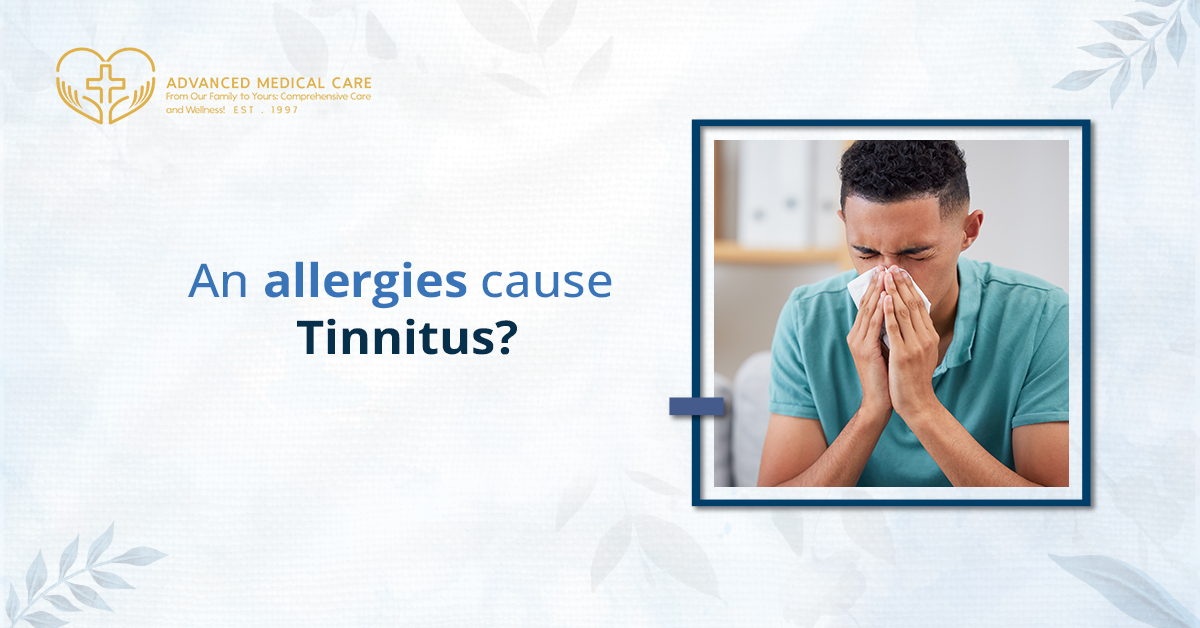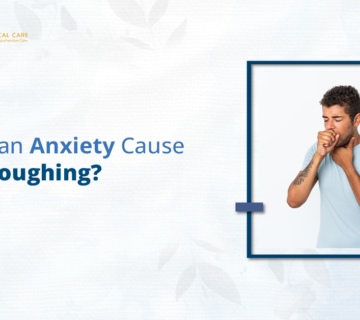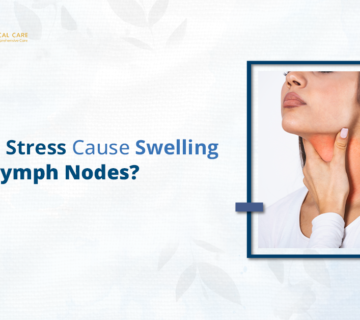Tinnitus is an ear noise without a sound generator. Numerous individuals across the world face it.
Tinnitus is mainly related to sound loss or excessive noise. So, many people ask, can allergies cause tinnitus?
Below, we will explore the link between allergies and tinnitus. We will cover the signs of trouble, and ways to treat and prevent both.
When health issues arise, Advanced Medical Care is here to help. We offer urgent care for many non-emergency conditions, like minor illnesses and allergies.
You can reclaim your time and focus on what matters most. No appointment needed, walk in today or book online.
What Is Tinnitus?
Tinnitus is an internal sound. It can be a ringing or buzzing noise. The volume and duration can vary. Tinnitus is not a disorder. It frequently indicates a hidden problem, such as:
- Ear infections
- Hearing loss
- Exposure to loud noises
Sufferers may feel an occasional nuisance, but for some, it can develop into a condition that lasts for their lifetime and is very severe.
Can Allergies Cause Tinnitus?
Yes, allergy issues can enhancement of tinnitus. In an allergic reaction, the body defends itself. It produces and releases histamines and other chemicals.
These destructive components can cause the processes of inflammation in different body areas, including the auditory organs. This inflammation can be caused by a fluid buildup in the middle ear and Eustachian tube dysfunction.
The tube of Eustachius can help control the pressure in the ear, and when it is inflamed, blocked or swollen, the problem can take the form of ear fullness or pressure which can manifest as ringing in ears allergies.
Common Allergies Linked to Tinnitus
Several allergies can trigger or worsen tinnitus:
Seasonal Allergies
Seasonal reactions can be a headache in spring. Pollen in the air can cause:
- Sneezing
- Itchy eyes
- Congestion
This nasal inflammation may affect your ears. It can lead to eustachian tube issues and intensify tinnitus.
Food Allergies
Food allergies rarely cause tinnitus, but some foods can trigger inflammation, including:
- Dairy
- Gluten
- Nuts
This inflammation might travel through your body. It can affect your ears and sinuses, increasing tinnitus sounds.
Environmental Allergies
Environmental reactions cause hay fever, resulting in nasal and sinus swelling. This produces fluid overabundance and eustachian tube complications, which can make tinnitus more severe.
Medication Allergies
Some medicines, e.g. antibiotics and painkillers, can also cause the ear to be the affected part of a body in an allergic reaction.
These side effects might be temporary, disappearing when the fluid balance is restored, but some of them can also lead to a permanent tinnitus state due to the ear being under pressure.
Symptoms that Link Allergies and Tinnitus
If your tinnitus is from allergies, you might have symptoms like:
- Ear fullness or pressure
- Muffled hearing
- Sinus congestion or facial pressure
- Runny or itchy nose
- Sneezing or watery eyes
Signs frequently align with seasonal allergies or allergen exposure.
Can Allergies Cause Tinnitus in One Ear?
Allergies, and tinnitus can be affecting of just one ear. This mostly happens when the immune response is more intense on one side of the head, causing the specific ear to become inflamed or pressure to build up in that ear.
If you only have congestion or swelling on one side of your nose or sinuses, it might result in only one ear having tinnitus.
Treatment for Allergy-Induced Tinnitus
To relieve ringing in your ears caused by allergies, treat both issues. Here are some effective solutions:
- Allergy Medications
Antihistamines and decongestants are vital. They fight nasal congestion, which often worsens tinnitus. The right antihistamine for tinnitus can clear a blockage in your eardrums.
- Ear Ringing Medication
Many people suffer from ear ringing, but there is no one remedy for it. Meanwhile, the symptoms of tinnitus can be mitigated by treating allergies.
If you have clogged, stuffed-up ears and a heavy head, decongestants or nasal sprays can be a cure.
To solve the problem and achieve the normal performance of hearing organs, specialists use one of these methods to decrease the blockage in the ear or to eliminate earwax.
- Decongestants
Decongestant clears sinuses and nasal passages. Also, it is the pressure releasing that the pressure that may be behind the tinnitus, that is ringing in your ears will be removed.
Pseudoephedrine, which is available over the counter, is a favored choice for relieving symptoms.
- Lifestyle Changes
Beyond medications, keep your environment allergen-free. A clean space helps reduce flare-ups. Use air purifiers and keep windows closed during high pollen days for better breathing.
- Ear Drops
Sometimes, corticosteroid ear drops can reduce inflammation in the ear. These drops might lower the volume of tinnitus caused by allergies.
Does Flonase Cause Tinnitus?
Flonase is a strong nasal spray for allergy management. It calms inflammation in the nasal tracts. Most users find it safe.
However, some experience unusual ear sensations, like ringing in the ears. If you feel Flonase is leading to complications, reach out to your physician. They can find better treatments for you.
Other Ways to Manage Tinnitus
Besides medications for the underlying condition, there are some other ways to help control your tinnitus:
Sound Therapy
Sound therapy can be a helpful way to manage tinnitus. Here are several choices you could explore:
- White noise machines
- Nature sounds
- Soft music
These noises help mask tinnitus, keeping it under control.
Cognitive Behavioral Therapy (CBT)
Emotional states influence tinnitus considerably. This therapy helps you manage them.
Mindfulness and Relaxation Techniques
Strain heightens tinnitus symptoms. Try relaxation techniques like:
- Deep breathing
- Meditation
These can help you find peace and ease your symptoms.
Preventing Tinnitus from Allergies
If you suffer from tinnitus due to allergies, there’s hope! With a few smart strategies, you can calm the symptoms before they get loud.
Here are some helpful tips to manage your allergies and protect your ears:
- Avoid Allergen
Minimize your exposure to allergens. Keep windows shut tight during allergy season. Use air purifiers and wash your hands after playing with pets or going outside.
- Follow Your Medication Plan
Follow your doctor’s advice on medication to prevent allergy and tinnitus.
- Clear the Nasal Congestion
If sinus pressure disturbs you, utilize saline products or air humidifiers. Clearing your nasal passages reduces ear pressure and lowers the risk of ear ringing.
- Stay Hydrated
Sip enough fluids to support your health. Hydration stops thick phlegm in your sinuses.
Final Thought
So, can allergies cause tinnitus? Yes. Allergy can result in Eustachian tube malfunction, inner ear inflammation, and other things causing tinnitus to appear or worsen.
Through taking medication for allergies that are antihistamines or decongestants and making lifestyle changes, you will be able to have a better life without both allergies and tinnitus.
If your symptoms get out of hand, visit a doctor. Tinnitus from allergies can be managed successfully.
FAQs
Can allergies cause ear ringing?
Yes. Ear ringing is a common allergy symptom. Caused by ear inflammation and pressure changes.
Which antihistamine is best for tinnitus?
Certain allergy prescriptions might also quiet tinnitus, such as:
- Loratadine
- Cetirizine
What is the best decongestant for tinnitus?
The decongestants that may also ease the congestion and pressure that probable may include:
- Pseudoephedrine
- Phenylephrine
These are the ones which can end tinnitus as perturbed by the allergies.






No comment